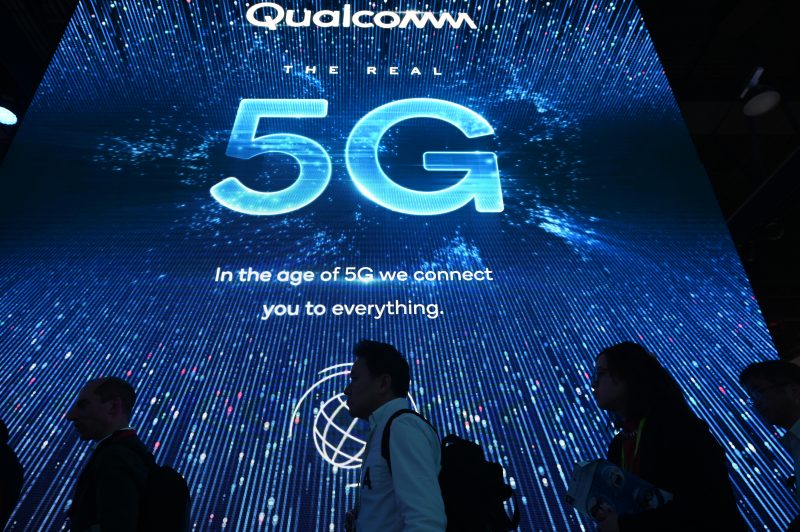Mobile chip titan Qualcomm hit by US antitrust ruling
Qualcomm, the dominant maker of smartphone processors, abused its market position at the expense of consumers and device makers, according to a US antitrust ruling (Robyn Beck)
Washington (AFP) – Smartphone chip giant Qualcomm suffered a fresh blow in its antitrust battle as a US federal judge ruled that it “strangled competition” for years at the expense of consumers and device makers.
Qualcomm shares sank some 11.5 percent in after trade Wednesday after the ruling that the company violated antitrust law, in a case with major implications for the smartphone market.
US District Judge Lucy Koh ordered Qualcomm to change its pricing and sales practices, after finding it “engaged in anticompetitive conduct” toward customers like China’s Huawei, Samsung and Sony.
“Qualcomm’s licensing practices have strangled competition” in the chip market “and harmed rivals,” she said in Tuesday’s 233-page ruling in the lawsuit brought by the US Federal Trade Commission.
The California-based company’s shares had soared after reaching a settlement with Apple last month over royalty payments for chips used in smartphones, which was expected to generate a windfall of $4.5 billion.
The judge issued an injunction requiring Qualcomm to comply with her order, and to submit to monitoring by the FTC for seven years.
FTC competition director Bruce Hoffman called the ruling “an important win for competition in a key segment of the economy” and said the agency “will remain vigilant in pursuing unilateral conduct by technology firms that harms the competitive process.”
– Qualcomm to appeal –
The company said it will seek an expedited appeal of the ruling.
“We strongly disagree with the judge’s conclusions, her interpretation of the facts and her application of the law,” Qualcomm executive vice president and general counsel Don Rosenberg said in a statement.
Koh cited statements from company executives that showed the “unlawful practices are ‘ongoing’ or likely to recur” since they were part of the firm’s strategy and it maintains a dominant position in the market.
The judge ruled that Qualcomm must negotiate terms for its patents on fair and reasonable terms without using threats or discriminatory tactics.
“Qualcomm must not condition the supply of modem chips on a customer’s patent license status and Qualcomm must negotiate or renegotiate license terms with customers in good faith under conditions free from the threat of lack of access,” the judge wrote.
John Bergmayer of the consumer group Public Knowledge hailed the decision.
“Judge Koh’s ruling shows that the FTC has the ability to bring, and win, important cases that protect American consumers,” he said.
Ed Black of the Computer & Communications Industry Association, a trade group that includes Google, Facebook and Microsoft and which sided with FTC, also welcomed the decision.
“Qualcomm improperly benefits from its use of standard essential patents that other companies use to build compatible products,” Black said. “This ruling is a win for wireless technology and American competitiveness in 5G.”
But Patrick Moorhead of Moor Insights & Strategy called the decision “a travesty.”
“To be found guilty, harm must be proved, and there was no evidence shown of harm to consumers, chipmakers or handset makers. Qualcomm will appeal and will likely win.”
The ruling marked the latest setback for Qualcomm, which has faced antitrust litigation in China, Europe and South Korea.
Qualcomm’s woes appeared to ease earlier this year when it agreed with Apple to settle all worldwide litigation in what had been a sprawling battle over royalty payments.
– Impact unclear –
Judge Koh said Qualcomm’s actions harmed rivals in the smartphone modem business, including Taiwan-based MediaTek and US-based Intel, which last month pulled out of the market for 5G modems at the same time Apple settled its case with Qualcomm.
In one example, the judge said Qualcomm has threatened to cut off chip supplies to Chinese device maker Lenovo if it began buying from Qualcomm rival MediaTek.
But the immediate impact is unclear in a smartphone market in turmoil over a US decision to blacklist China’s Huawei, the number two handset maker, from any American technology.
The ruling could open the door for Qualcomm rivals and partners to seek damages, but “Qualcomm has already settled with Apple, which was one of the key instigators of the case in the first place,” noted Avi Greengart of the consultancy Techsponential.
Still, the findings “could open up opportunities for MediaTek at the low end of the smartphone market, and in some markets for MediaTek’s 5G solutions,” Greengart noted.
However, Qualcomm is likely to remain the dominant producer for smartphone market in the short-term, the analyst noted.
“For the most part, Qualcomm has won based on its merits, not on its licensing terms,” he said.
Disclaimer: Validity of the above story is for 7 Days from original date of publishing. Source: AFP.


